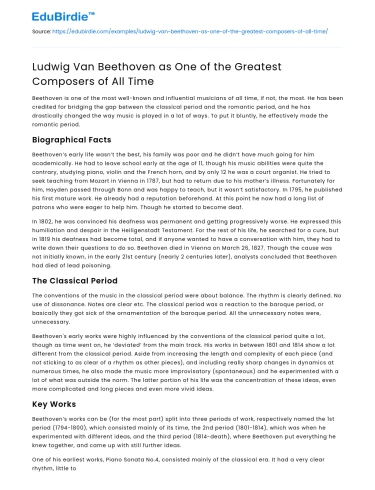Beethoven is one of the most well-known and influential musicians of all time, if not, the most. He has been credited for bridging the gap between the classical period and the romantic period, and he has drastically changed the way music is played in a lot of ways. To put it bluntly, he effectively made the romantic period.
Biographical Facts
Beethoven’s early life wasn’t the best, his family was poor and he didn’t have much going for him academically. He had to leave school early at the age of 11, though his music abilities were quite the contrary, studying piano, violin and the French horn, and by only 12 he was a court organist. He tried to seek teaching from Mozart in Vienna in 1787, but had to return due to his mother’s illness. Fortunately for him, Hayden passed through Bonn and was happy to teach, but it wasn’t satisfactory. In 1795, he published his first mature work. He already had a reputation beforehand. At this point he now had a long list of patrons who were eager to help him. Though he started to become deaf.
Save your time!
We can take care of your essay
- Proper editing and formatting
- Free revision, title page, and bibliography
- Flexible prices and money-back guarantee
In 1802, he was convinced his deafness was permanent and getting progressively worse. He expressed this humiliation and despair in the Heiligenstadt Testament. For the rest of his life, he searched for a cure, but in 1819 his deafness had become total, and if anyone wanted to have a conversation with him, they had to write down their questions to do so. Beethoven died in Vienna on March 26, 1827. Though the cause was not initially known, in the early 21st century (nearly 2 centuries later), analysts concluded that Beethoven had died of lead poisoning.
The Classical Period
The conventions of the music in the classical period were about balance. The rhythm is clearly defined. No use of dissonance. Notes are clear etc. The classical period was a reaction to the baroque period, or basically they got sick of the ornamentation of the baroque period. All the unnecessary notes were, unnecessary.
Beethoven's early works were highly influenced by the conventions of the classical period quite a lot, though as time went on, he ‘deviated’ from the main track. His works in between 1801 and 1814 show a lot different from the classical period. Aside from increasing the length and complexity of each piece (and not sticking to as clear of a rhythm as other pieces), and including really sharp changes in dynamics at numerous times, he also made the music more improvisatory (spontaneous) and he experimented with a lot of what was outside the norm. The latter portion of his life was the concentration of these ideas, even more complicated and long pieces and even more vivid ideas.
Key Works
Beethoven’s works can be (for the most part) split into three periods of work, respectively named the 1st period (1794-1800), which consisted mainly of its time, the 2nd period (1801-1814), which was when he experimented with different ideas, and the third period (1814-death), where Beethoven put everything he knew together, and came up with still further ideas.
One of his earliest works, Piano Sonata No.4, consisted mainly of the classical era. It had a very clear rhythm, little to no use of dissonance and there is no use of rubato. His first main work in his ‘experimentation period’ was ‘Eroica’. ‘Eroica’ delves deep into emotion and definitely isn’t in the same category as a lot of other classical works. ‘Eroica’ - meaning heroic is one of the first (or the first) symphony to delve into the unconscious. And it definitely didn’t have the same balance and clearly defined rhythm as other music of the time.
His last symphony was his famous Symphony No.9. For a start it used vocals in a musical genre, considered to be purely instrumental at the time. It was also considered by many as the bridge between the classical period and the romantic period, was decades in the makings (from evidence in Beethoven’s notebook), went through over 200 versions of only the part ‘Ode to Joy’. This symphony is considered to be his best composition. Though it didn’t catch on immediately, some were questioning his skill in writing for vocals and others questioned why there were any vocals at all. Though, this symphony was far ahead of its time and remarkable in every way.
Conclusion
Summing up, Beethoven was remarkable in every way and revolutionized music beyond (at the time) conception. Even today his music is immensely popular, for example, his Symphony No.9 has gotten over 100 million YouTube video views. Despite his hard early life and his deafness later on, he achieved much in music, and is still widely considered to be one of the best composers of all time.
Bibliography
- Ludwig van Beethoven. (2020). In Encyclopædia Britannica. Retrieved from https://school.eb.com.au/levels/high/article/Ludwig-van-Beethoven/273148
- Ludwig van Beethoven. (1998). In Encyclopedia of World Biography Online. Gale. https://link.gale.com/apps/doc/K1631000534/BIC?u=61unihigh&sid=BIC&xid=738412d2
- Testament, J. (2019). In 'John Bell Reads Beethoven's Heiligenstadt Testament'. Retrieved from https://www.abc.net.au/classic/read-and-watch/videos/john-bell-reads-beethovens-heiligenstadt-testament/11186814
- Prelude, T. (2020). In ‘Beethoven Piano Sonatas: How the Composer Broke the Mould’. Retrieved from https://www.classicfm.com/composers/beethoven/guides/beethoven-the-piano-sonatas/#:~:text=Having%20mastered%20the%20form%20as,technology%20in%20the%20early%201800s.
- Piano Sonata No. 4. In Piano Sonata No. 4 in E flat major ('Grand Sonata'), Op. 7 Retrieved 13 September 2020, from https://www.allmusic.com/composition/piano-sonata-no-4-in-e-flat-major-grand-sonata-op-7-mc0002365724






 Stuck on your essay?
Stuck on your essay?

